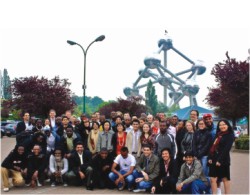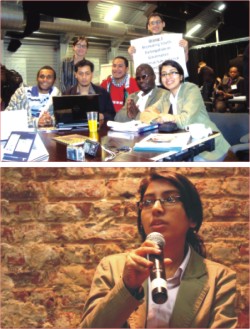Going Global
Global youth against corruption
Sadia Doha
 THE fight against corruption is a huge challenge for us. We like to talk about it in coffee tables, meetings, even on TV, but when it comes to taking a stand we simply ignore it. We blame the system, but it really depends on us, whether we want to make a change or not. I want to make a change and I had the opportunity to meet another 49 young people from around the globe who also want to make that change. THE fight against corruption is a huge challenge for us. We like to talk about it in coffee tables, meetings, even on TV, but when it comes to taking a stand we simply ignore it. We blame the system, but it really depends on us, whether we want to make a change or not. I want to make a change and I had the opportunity to meet another 49 young people from around the globe who also want to make that change.
I work as a Youth Engagement & Support (YES) volunteer at the University of Liberal Arts Bangladesh (ULAB). YES is a program under the Transparency International Bangladesh (TIB) to promote youth leadership. There are 36 YES groups all over Bangladesh and 16 more in Dhaka, with over 2000 members. YES gives young Bangladeshis the platform to raise our voices against corruption.
One day, Rezwan-ul-Alam, Director of Outreach & Communication of TIB, called me to represent the youth of Bangladesh in the "Global Youth Forum: Mobilizing Youth Against Corruption" in Brussels, Belgium on May 26-28, 2010. This forum was being held to expand the Global Youth Anti-Corruption (GYAC) network. The program was organized by World Bank Institute (WBI), and supported by Jeunesses Musicales International, ANSA-EAP (Associated Network for Social Accountability in East Asia Pacific) and EJC (European Journalism Centre).
The forum brought together 50 young civil society leaders, musicians and journalists from around the world to exchange our experiences and formulate action plans to fight corruption. It was a huge opportunity for me, to show the world that Bangladeshi youth are working hard to build a better country.
The forum began on May 26, and that day it was raining heavily. Fortunately I brought an umbrella, and by sharing it I made my first friend, Dona Kosturanova from Macedonia. The forum was held at the Beursschouwburg in the medieval heart of Brussels, and opened with speeches by Raj Chawla, Ed Campos and Boris Weber from World Bank Institute.
We each made presentations on our ongoing work, interests, and intended future directions. We were then divided into smaller groups based on thematic interests. Each group worked together throughout the conference on individual action plans, as well as a potential common action plan. The main five themes were:
 1. Promoting youth participation in governance 1. Promoting youth participation in governance
2. Fighting corruption in resource-rich countries
3. Fighting corruption in service deliveries
4. Monitoring elections and protecting human rights
5. Building ethics and integrity of the next generation
I had the opportunity to moderate Group One with my new Zimbabwean friend Mudimu Zekiya Ezekiel from the Simuka Africa Youth Association. Our group members were from Peru, Lebanon, Nepal, Mongolia, Papua New Guinea, Tanzania, Vanuatu, Italy and USA. We had sessions on Culture & Development, Strategic Communication, and Negotiation, with remote correspondents from Bulgaria, Pakistan, Nepal, Sierra Leone and Macedonia.
In the evening we went to the Fairplay concert presented by World Bank Institute and Jeunesses Musicales International. The three bands were:
Mafilika : Afro-Rock-Reggae from Malawi.
Katya Emmanuel: Hip Hop from Democratic Republic of Congo.
I-Voice: Palestinian hip hoppers from Beirut.
It was an open concert and there was a huge crowd. Though the Lebanese band rapped in Arabic, the music was amazing. Many Palestinians came to show their support.
The second day started with the topic of Governance and Anti-Corruption (GAC). For this, we had online correspondents from the Philippines, Cameroon, Sierra Leone and Nepal. Two of my colleagues - David Garcia from Paraguay and Mohammad Al-Bous from Qatar - gave presentations on their work in the Global Change Maker Program by British Council, which was very inspiring for me.
There was session on Leadership by Raj Chawla based on the work of Ron Heifetz and Marty Linsky, where we learnt the term Adaptive Leadership, a technique where a leader learns through adaptation how to overcome challenges. He showed us how we can improve the design and implementation of our anti-corruption projects.
Later we had a session on ICT, and developing strategies to use ICT for GAC. Here we had remote correspondents from Zambia, UK, Kenya, Malawi and Burundi. Not only did we talk about ICT, but we used ICT throughout. We had correspondents video conferencing from across the world. WBI officials uploaded photos, videos and details of the events on the website every minute. What impressed me most was the way that digital technology can bring us together for faster and better communication.
The main attraction that night was dinner at the Atomium, a 335-foot steel structure that has the shape of an iron crystal. In front of the Atomium we had our official photo, and if you look at the photo closely, you can find all the colors of the world.
The final day was mostly wrap-up. We reviewed our past work and discussed how we will expand the GYAC network. The journalists joined us and gave their presentations. Each group submitted a report and gave a presentation. I represented my group. We decided on establishing regional task force, and opening chapters in our countries, and also engaging the other youth organizations.
At the end, our musicians gave their final performance. They sang in three different languages, but using the same tune. We sang together and learnt that complexion, culture, region, country even language cannot come between us when we are “Together Against Corruption”.
This event was mainly aimed at strengthening the Global Youth Anti-Corruption network by engaging emerging leaders in building stronger social accountability. We met new people, became colleagues, and then friends, with one desire: eradicate corruption. Our responsibility is to expand the message as far as possible, and for that we need all Bangladeshi youth to participate.
If anybody wants to join the fight then log in to: www.voices-against-corruption.ning.com and join the South-East Asia taskforce. The journalists' work can be viewed at: www.sevenagainstcorruption.blogspot.com
(Sadia Doha is a Media Studies and Journalism student at the University of Liberal Arts Bangladesh (ULAB) and Team Leader of ULAB-YES.)
| 